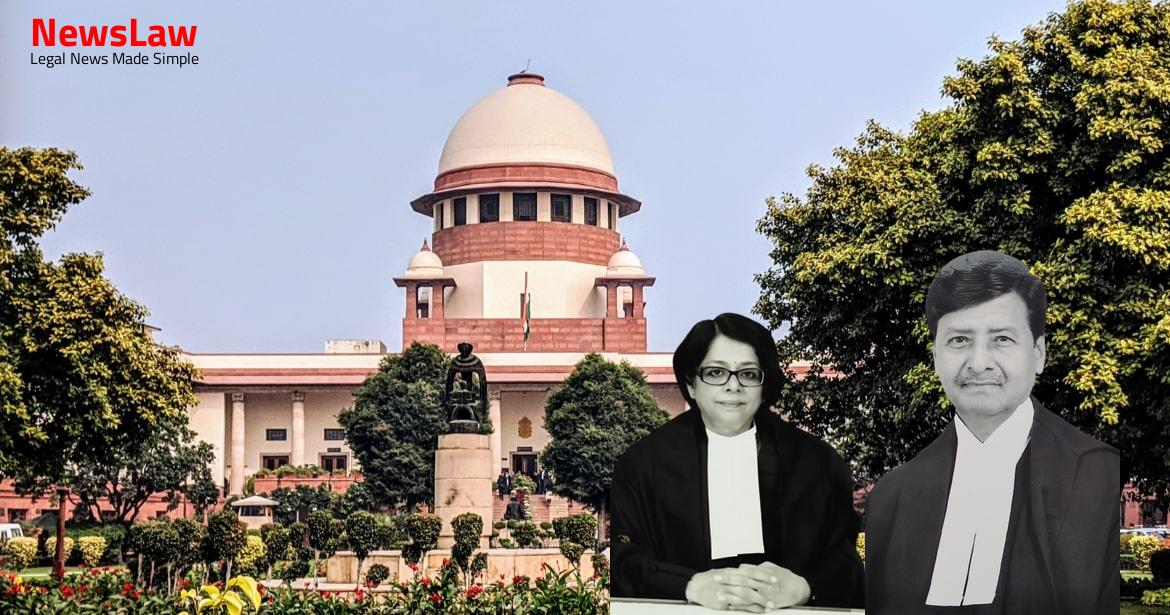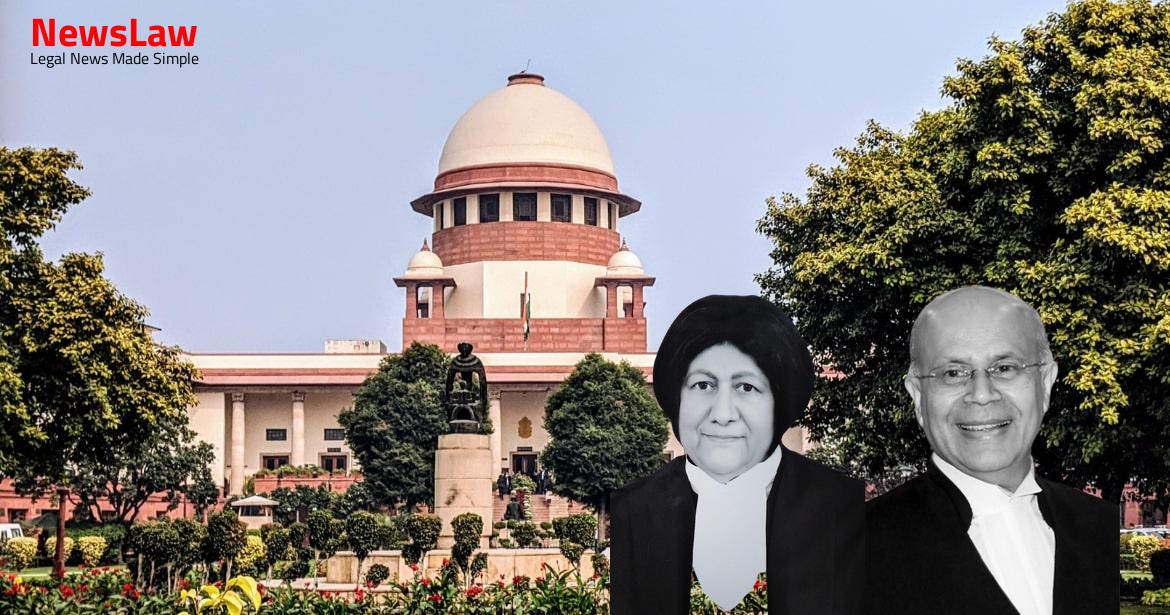Explore the detailed legal analysis surrounding the withdrawal of tax exemptions in a revival scheme context. The court’s emphasis on interpreting tax statutes, promissory estoppel principles, and public interest in taxation decisions provides a nuanced understanding of the case at hand. Dive into the complexities of tax laws and government actions through this insightful read.
Facts
- The appellant availed waiver benefit of past tax arrears and exemption on Works Contract Tax as part of a revival scheme for a sick unit.
- Government initially issued Orders granting exemption, but later withdrew them citing specified class limitations.
- Subsequent Government Orders canceled and reinstated the exemption benefits multiple times.
- Appellant argued that the exemption was part of a ‘package deal’ in line with SICA provisions and BIFR sanctioned scheme.
- Appellant actively involved in reviving the sick unit, and State’s withdrawal of exemption benefits was seen as a breach of promise.
- Investment for revival was offered by the appellant with discussions and concessions given by stakeholders.
Also Read: Legal Analysis of Assignment and Ratification in Property Law
Issue
- The issue to be considered is the benefit of tax exemption in works contract under the SICA based on Kerala Government communication dated 20.3.2004 (Ext. P-2) being withdrawn by a subsequent government order dated 21.11.2006 (Ext. P-3).
- The appellant took over a sick industrial unit named M/s Teak Tex Processing Complex Ltd. engaged in dyeing of clothes.
Also Read: Interpretation of Custody in Contempt of Court Case
Arguments
- The appellant argued that the benefits offered, including waiver of past arrears under Sales Tax/Works Contract Tax, are binding on the State under Section 19(3) of SICA.
- The government advocate argued that the withdrawal of tax exemption benefits is within the government’s power and can be done in the public interest.
- The appellant had profitable years in 2015, 2019, and 2020, but incurred losses in the subsequent years.
- The High Court questioned whether tax exemption could be granted to the appellant alone under Section 10 of the KGST Act, as opposed to a class of industries.
- The respondents contended that the benefits offered included exemption from sales tax/works contract tax among others, and the power to grant tax exemption is sourced from Section 10(1) of the KGST Act.
- The 2004 Government Order and the BIFR Sanctioned Scheme of 2005 did not specify a timeline for tax exemptions as prescribed in the 1994 government order.
- The appellant did not identify any other provision empowering the State Government to grant such tax exemptions.
Also Read: NGT Jurisdiction and High Courts’ Role
Analysis
- In the case of Voltas Ltd. Vs. State of A.P., the court emphasized the importance of interpreting tax statutes based on plain language and strict interpretation.
- The court highlighted that purposive interpretation should only be considered in cases of ambiguity or absurd results.
- The principle of promissory estoppel cannot be invoked for promises expressly prohibited by a statute, as seen in Bangalore Development Authority Vs. R. Hanumaiah.
- The court reiterated that promissory estoppel cannot be applied contrary to the statute, even if benefits were wrongly given in the past.
- In the case at hand, the appellant’s tax exemptions under the 2004 government order were found to be ultra vires the KGST Act, and perpetuating such exemptions would be against public policy.
- The court also referenced Abraham Lincoln’s stance on breaking promises for the greater good and emphasized that the principle of promissory estoppel cannot enforce unlawful promises.
- The Kerala High Court concluded that the appellant did not form a separate class for tax concessions as per the 2004 government order.
- Promissory estoppel cannot compel the government to act against the law, as seen in various legal precedents.
- Exemption provisions and notifications should be strictly interpreted in line with legislative intent, as highlighted in the Arcelor Mittal Nippon Steel case.
- Justice H. L. Gokhale differentiated between promissory estoppel and legitimate expectation, emphasizing the inability to force actions contrary to the law.
- Lastly, the court reaffirmed that tax exemptions granted by the state can be withdrawn prematurely in the interest of protecting public interest, regardless of any promissory estoppel principles.
- Section 10 of the KGST Act provides the power to grant exemption and reduction in tax rates.
- Exemptions granted under Section 10 must be in the public interest and can be cancelled or varied at any time.
- The power under Section 10 is for a class of persons and not for individual units.
- The appellant’s exemption was granted under a BIFR scheme and government orders, not under Section 10.
- The withdrawal of exemptions in 2006 was justified as it was specific to a single unit and not a class of persons.
- The Government’s actions were in accordance with the law, and the principle of promissory estoppel cannot be invoked against it.
- Tax exemptions were linked to specific periods and financial conditions of the company.
- The State was not obligated to provide tax exemptions indefinitely, and public interest was a significant factor in decision-making.
- Section 17 of the Sick Industrial Companies (Special Provisions) Act deals with the powers of the Board to make suitable orders on completion of an inquiry.
- If a company is deemed a sick industrial company after an inquiry, the Board decides whether it is practicable for the company to make its net worth exceed the accumulated losses within a reasonable time.
- If it is deemed practicable, the Board gives the company a specified time to improve its financial situation.
- The Board may review any sanctioned scheme and make modifications if necessary, or order the preparation of a fresh scheme.
- Any scheme prepared by the operating agency must be examined by the Board, and modifications may be made based on suggestions and objections received.
- The schemed must be approved by shareholders of any other company concerned in the amalgamation through a special resolution.
- The sanctioned scheme becomes binding on all parties involved, and the Board may direct the implementation of the scheme by the operating agency.
- Appellant is a company that has managed to turn its financial situation around and is now profitable.
- This positive change in the company’s financial status is relevant to the case at hand.
- It is important to consider the current profitability of the appellant when assessing the impact of the judgment.
Decision
- The final conclusion is that the appeal must fail based on the grounds previously mentioned
- The appeal is dismissed without any order regarding costs
Case Title: AUGUSTAN TEXTILE COLOURS LIMITED (NOW AUGUSTAN TEXTILE COLOURS PRIVATE LIMITED) Vs. DIRECTOR OF INDUSTRIES (2022 INSC 408)
Case Number: C.A. No.-002830-002830 / 2022



